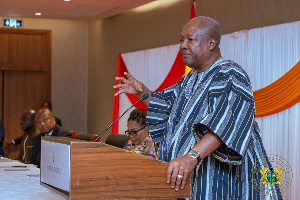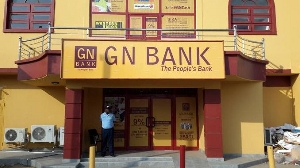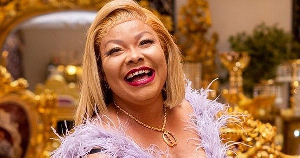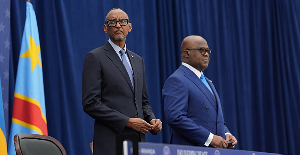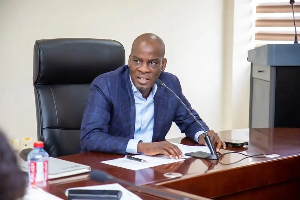By Gibril Koroma, Vancouver, Canada.
gkgkoroma@gmail.com, 01-604-308-6087.
The popular Ghanaian greeting “Akwaaba (Welcome) to the Global Classroom” welcomed Kwantlen Polytechnic University students in Surrey, British Columbia campus (top photo) when they signed into Dr. Charles Quist-Adade’s Sociology of Global Inequalities and Globalization.
It turned out that the Ghanaian greeting will not be the only cross-cultural lesson these Canadian students would learn in the highly interactive and innovative web conferencing course, which they took together with their peers from Ghana.
Indeed, the course offered them multiple lessons and opportunities for cross-cultural friendships, shared experiences, exchange of new ideas and information about the nuances, as well as similarities of the cultures of Ghana and Canada.
The course, which was built on the principles of the “global village” and “classroom without walls,” employed simple “integrative information and educational technologies (Wiziq and Moodle) to break the boundaries of time, space and distance thereby facilitating the sharing of knowledge between the students at the Ghana Institute of Journalism, Kwame Nkrumah University of Science and Technology and Kwantlen Polytechnic University,” explained Dr. Quist-Adade.
The partially on-line course used a mixed mode delivery, combining synchronous video-audio streaming, real chat, online materials, pre-packaged online materials, as well as asynchronous chat sessions. It is the second phase in a pilot project initiated in 2008 by Dr. Quist-Adade and his Ghanaian collaborators, Dr. Akosua Darkwah of the University of Ghana, Dr. Vincent Dodoo of the Kwame Nkrumah University of Science and Technology, Kumasi and Mr. Kodwo Ansong Boateng of Ghana Institute of Journalism, Accra.
I recently attended one of Dr. Quist-Adade’s classes at the Surrey campus during which I closely observed the students at work. At the end of the class I asked some of them, together with their counterparts in Ghana, to first introduce themselves, tell readers why they decided to do this course, what they had learnt from it, what project they had been working on and what they would do if they were High Commissioner of Canada in Ghana and vice versa. I also asked them to let us know what they plan to do with the knowledge they had gained. Here are their responses:
From Andrews Dwommor (Ghana):
Andrews Dwommoris my name. I am a final year student of Bsc. Business Administration (Accounting option) at Kwame Nkrumah University of Science and Technology, Ghana.
I have aspired to broaden my knowledge beyond the scope of finance, management and accounting into spheres like economics, philosophy, politics and sociology especially in the area of globalization. A course such as this presents that perfect opportunity. I have gained much by reducing my ignorance in areas I could not have had any knowledge in were it not for this course, specifically, the gap between the North and the South, globalization, prevailing global issues in all diverse areas, etc.
We in Ghana were not to work on any project/presentation but to write a report on a chosen group,expressing our views on their performance. I have selected Gender Inequalities.
If I were Ghana’s Ambassador to Canada, my main concerns would in areas the Canadian government could cooperate with my government to promote our development agenda. For example educational cooperation for exchange programmes, scholarships, etc and promotion of Ghanaian industries especially the SME sector which is of concern to me, because it represents 90% of businesses in the country.
My personal ambition in life is to impact positively on society. I come from a poor family since and I have seen and experienced poverty and I have struggled to make it this far.Now that I have been more enlightened about global poverty, the least opportunity I get in life will be used to help better the lives of others.
Anu Bains (Canada)
My name is Anu Bains and I am currently in my third year of Criminology at Kwantlen Polytechnic University. I chose this course because not only did it work as an elective requirement for my program but because Dr. Charles QA was the professor. I have taken courses with him in the past and have loved them!
I have learned about the various global inequalities that exist in the world. Moreover, we have been given the opportunity to set out our own goals and plans to tackle various issues at stake. An example would be environmental sustainability.
In our project we discussed the issue of environmental sustainability. There is only a limited amount of natural resources on this planet, which are unfortunately being exploited by individuals mainly from developed countries. Some of the repercussions include pollution, deforestation, and loss of biodiversity. In addition many people around the world still do not have access to clean drinking water or proper sanitation.
My main concern (as Canadian High Commissioner to Ghana)would be with deforestation. It is important that the forests of Ghana be preserved so that there is biodiversity. This would allow for a balance in the circle of life.
This course has made me aware of the issues that surround us. The knowledge I possess now will enable me to make better decisions when it comes to the environment. It is also important for me to pass this knowledge on to others so that there are more people trying to make changes.
George Adjei (Ghana)
My name is George Adjei, a final year student at the Ghana Institute of Journalism, studying for a degree in BA Communication with a majoring option in Journalism.
I took this course because because the course topic itself is intriguing, thought provoking and will make you stop at nothing till further interrogations and probings are done into it. As a journalist, it is ideally expected of you to have a fair knowledge about the object (i.e the world) through and around which your stories revolve.
Before taking the course, I personally had a funny idea about the concept of Globalization and its related topics. I perceived the concept to be a misguided and deceptively crafted "ideal" of the capitalist world to further deteriorate the economies of the third world countries in order to grab the remaining resources that they [capitalists] left after taking most of the resources away.
I have learned a lot. In the short term, I can confidently say without any reservation that this course was organized for me and me alone. My horizon has been broadened and I can better analyze global situations more than ever before.
Unfortunately, we Ghanaian students could not make any presentation on any project due to how we are scattered in different Universities. I hope in the near future, the course instructors would work on this to ensure that we participate in all aspects of the course.
If I were Ghana’s Ambassador to Canada, my priority would be to understand their (Canadian)way of life. That would definitely help me integrate into their society in order to give me a smooth platform to implement whatever policies that may be available for implementation.
It is not a matter of what do I plan to do with the knowledge. That has already started manifesting itself in me through my recent analysis of global trends in the world on air [i.e radio programmes] and the feedback is quite encouraging! Another dose of this course is highly recommended by me.
Emott Douglas (Canada)
My name in Emott Douglas and I am working on my Bachelors degree in criminology. I work as a community support worker for individuals with developmental disabilities. I originally took this course because it looked interesting and I enjoy sociology. By taking this course I have been able to further deepen my sociological imagination about the many inequalities in the world.
When I first took this class I knew that there were many inequalities between people and nations. However, I did not fully understand the severity and intricacies of global inequality until we explored inequality in class. Dr. Quist-Adade’s class has made me realize that global inequality is linked to my way of life, and that the actions and decisions I make effect people around the world. My project was about environmental sustainability, and how humans need to only produce what is needed for human existence. If developed and developing nations followed a system of environmental sustainability, resources would have the chance to regenerate and provide life for future generations.
If I was High Commissioner to Ghana, my first main concerns would be to increase the standard of life for impoverished citizens, and to encourage a system of environmental sustainability. As High Commissioner I would use my position to try and convince politicians to make changes in economic policies. I will take the knowledge from this course and attempt to deepen my knowledge even further and learn as much as I can. Once I have my degree, and I will choose a career path that will solve the problem of global inequality.
Martha Daitey (Ghana)
My name is Martha Daitey, a Ghanaian third year Communication Studies student of the Ghana Institute of Journalism
I took the course because my lecturer recommended that I do so which was last year but due to certain technical hitches,I could not take it fully. I thus chose to take it fully this time around to continue what I started last year. I have learned how very interrelated and connected various countries in the world are and how are actions as individuals and as a nation affect others elsewhere on planet earth.
If I were Ghana’s High Commissioner to Canada, my main concern would be with the media (locally based and international) and their way of portraying Ghana to the rest of the world. I would with assistance put in place measures to ensure that Ghana in presented in her best form and not treated as a victim of "development pornography."
As a potential media practitioner,I would create awareness about some of the unintended consequences of our actions both in our country and outside. The knowledge acquired will thus help me create a better and positive image of my country in an effort to help it make the lives of her citizens better.
Juliet Oppong-Boateng
I am Juliet Oppong-Boateng, a graduate from KNUST currently undertaking my national service. I decided to take this course because I wanted to get a deeper knowledge of what the globalization phenomenon is all about and also offered me the opportunity to get a live interaction with fellow students in Canada.
I have learnt of the global inequalities that exist and also the fact that the globalization phenomenon is not a recent one but rather gathering momentum in this 21st century.
Unfortunately due to tech
ical problems, we the Ghanaian students could not be part of the project.
If I were Ghana’s High Commissioner to Canada, my main concerns would be on child education, child labour and a continuous push for more of women empowerment. This is because children are the future leaders so they need a good beginning. Women cant be left out because they have potentials that are not being tapped as they are supposed to. Steps are being taken to address these issues but more can be done.
I plan to let others understand the circumstances in which we find ourselves now in this 21st century and how to enable us gain the best and positive impacts of globalization whilst trying harder to minimize its side-effects.
Opinions of Sunday, 15 May 2011
Columnist: Koroma, Gibril


